#文法
Text
接続詞(せつぞくし)
conjunctions - words that are used to link phrases together
情報を加える // Adding information:
しかも besides
そのうえ moreover, on top of that
さらに moreover, on top of that
そればかりか not only that, but also...
そればかりでなく not only that, but also...
情報を対比する // Putting into contrast:
それに対して in contrast
一方 whereas
他の可能性・選択肢を言う // Giving alternatives:
あるいは or perhaps (presenting another possibility)
それとも or (presenting another option within a question)
結論を出す// Drawing a conclusion:
そのため for that reason
したがって therefore
そこで for that reason (I went ahead and did...)
すると thereupon (having done that triggered sth. to happen)
このように with this (adjusting a conclusion to the arguments given beforehand)
こうして in this way
理由を言う // Giving a reason:
なぜなら...からだ the reason is
というのは...からだ the reason is
逆説を表現する // Expressing a contradiction:
だが however, yet, nevertheless (contradicting what one would have expected)
ところが even so (spilling a surprising truth)
それなのに despite this, still
それでも but still (despite a certain fact, nothing changes)
説明を補う // Amending one's explanation:
つまり that is, in other words (saying the same thing using different words)
いわば so to speak (making a comparison)
要するに to sum up, in short
説明を修正する // Revising one's explanation:
ただし however (adding an exception to the information stated beforehand)
ただ only, however
もっとも however (obviating any expectations that might arise through the previous statement)
なお in addition, note that (adding supplementary information)
話題を変える // Changing the subject:
さて well, now, then (common in business letters after the introductory sentence; is often ignored in tranlations)
ところで by the way
#文法#grammar#conjunctions#japanese grammar#jlpt n2#japanese langblr#japanese language#language#japan#japanese#japanese vocabulary#langblr#linguistics#studyblr#study blog#studyspo#study motivation#study aesthetic#study notes#learning japanese#nihongo#日本語#日本語の勉強#light academia#light acadamia aesthetic
661 notes
·
View notes
Text
JLPT Grammar みたいだ・らしい・っぽい
What is the difference in usage among みたいだ、らしい、and っぽい? These grammar points can be difficult to differentiate, so I have gathered some notes and examples here. These grammar points are JLPT N4 or N3 grammar points.
★みたいだ★

Used for first-hand information or information you are observing for yourself.
Often used for something that has characteristics of something else (metaphorical similarities).
Most common in spoken language.
ここの砂は星みたいな形をしている。
ここ の すな は ほし みたいな かたち を して いる。
The grains of sand here are in the shape of a star.
このアパートは誰も住んでいないみたいだ。
この アパート は だれ も すんで いない みたい だ。
It looks like no one lives in this apartment building.
明日は雨みたいね。
あした は あめ みたい ね。
It looks like rain tomorrow.
リンさんみたいに日本語がうまくなりたい。
I want to be able to speak Japanese as well as Lin.
★らしい★

Used for things you infer, or information you have from another source.
Often used to something that has especially strong characteristics of its group (stereotypical similarities).
Most common in spoken language.
今日は春らしい暖かい日でした。
きょう は はる らしい あたたかい ひ でした。
Today was a warm spring-like day.
*Note: It is spring, and this is a stereotypically spring day.
私は女性らしい洋服はあまり着ない。
わたし は じょせい らしい ようふく は あまり きない。
I don't often wear feminine type clothes.
寝すぎるのは体に悪いらしいです。
ねすぎる の は からだ に わるい らしい です。
Sleeping too much is apparently bad for your body.
*Note: Second-hand source of information.
今日は君らしくないな。
きょう は きみ らしくない な。
You don't seem like yourself today.
★っぽい★
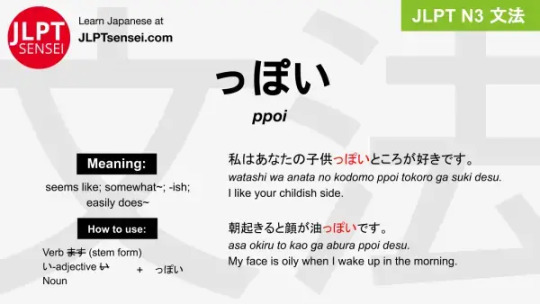
Can be used to say what something is like.
Can be used to say that something appears to be the opposite of what you would expect.
Can be used to describe something that someone is likely to do or often does.
Note:
When following a noun or い-adjective, the meaning is similar to -ish, -like, -ly. The number of adjectives that can be used with this grammar are limited. Usually negative when used after a noun or adjective, but not always.
When following a verb, the meaning is easy to do, often do. This grammar cannot be used with all verbs.
あの小学生は大人っぽい。
あの しょうがくせい は おとなっぽい。
That elementary school student acts like an adult.
油っぽい食事は好きじゃない。
あぶらっぽい しょくじ は すき じゃ ない。
I don't like oily foods.
飽きっぽいから何事も成功しないのだ。
あきっぽい から なにごと も せいこう しない の だ。
You don't succeed in anything because you are quick to lose interest.
年を取ると、忘れっぽくなる。
とし を とる と、わすれっぽく なる。
As one gets older, one tends to become more forgetful.
#日本語#japanese#japanese language#japanese langblr#japanese studyblr#langblr#studyblr#文法#japanese grammar#jlpt n3#jlpt n4#tokidokitokyo#tdtstudy
144 notes
·
View notes
Text
Grammar Review: はず
Please note that I am still a beginner in Japanese and the sample sentences are my own, so they may contain mistakes or sound unnatural. If you have any corrections or feedback, then please tell me so I can fix it!
Verb (casual) + はず (+です)
Adjective (dictionary form) + はず (+です)
Noun + の + はず (+です)
Must, should, is supposed to. Indicates what the speaker expects.
マンチェスターシチはプレミアリーグを勝つはず。Manchester City should win the Premier League.
子どもに教えることは楽しいはず。Teaching children must be fun.
毎日勉強していたから、テストは簡単なはず。Because I've been studying every day, the test should be easy.
スーツを着ている男の人は課長のはずです。The man in the suit must be the manager.
Past tense + はず (present tense): I'm sure X happened
Present tense + はず (past tense): I was sure X would happen/X was supposed to happen:
テストが簡単だったはず。The test should have been easy (I didn't take the test, but I expect it was easy)
テストが簡単なはずだった。The test should have been easy (I expected the test to be easy, but it wasn't)
You don't use はず to mean 'should' when giving advice. Instead, use 〜た方がいいよ
疲れたら、寝た方がいいよ!If you're tired, you should sleep.
You don't use はず to mean 'must' as in 'have to'. This is a separate grammar point that would need its own post to explain.
Please let me know if I've made any mistakes!
#japanese#japanese langblr#learning japanese#日本語#japanese grammar#文法#bonus: i learned the word 朝飯前 and asked my japanese friend how to use it with はず#and she said you never use it with things you're unsure about. only things that are 100% certain. so you can't use it with はず!
47 notes
·
View notes
Text
The Complete JLPT N4 Grammar Video(Game) Textbook
youtube
16 notes
·
View notes
Text
Hi! Hope y'all are good.
My exams went great and I'm finally getting back on track with Japanese. I did a grammar point today, along with some 語彙 and 漢字!
It's definitely difficult lol but it's fun to study something else after so long! 🤍

#japanese#japanese language#jlpt#jlpt n2#languages#studyblr#studying#japanese books#language learning#study with me#語彙#漢字#文法#日本語
21 notes
·
View notes
Text
て-Form + は
晴れてはまた雨が降って、全然外に出られない。
はれては また あめが ふって、ぜんぜん そとに でられない。
As soon as it clears up, it rains again, so I can't go outside at all.
The grammar Verb A in theて-Form + は + Verb B when something happens repeatedly in a cycle.
16 notes
·
View notes
Text
文法:〜ては(If・Because + Bad Result/Whenever ~/Repetitive Actions)
A(て-form)+は、B。
In spoken Japanese, ては and では become the contractions ちゃ and じゃ respectively.
We’ve seen ては combine with phrases like ならない、だめ、いけない to mean something that you “must not do.” However, ては has several different uses.
If・Because + Bad Result
Aては、B。
(A[普通形]+のでは、B。)*
If/Because A, then B (Bad Result).
This is the base form for the grammars てはいけない and しなくちゃならない. ては is a conditional whose usage is very similar to ~たら, but while ~たら is neutral, ては carries a negative implication. It's used to express a negative result due to some action, or even just one's negative reaction to that action.* While it's common to see it paired with だめ・ならない・いけない like in the above grammars, it is not limited to those endings.

先輩 ついてきちゃ意味ないです[ビクッ]
Senpai, there's no point if you're just going to follow me. [Startled]
[Speaker is on an errand from Senpai to fetch a drink.]
(『月刊少女野崎くん』 Girl’s Monthly Nozaki-kun,vol. 1 by Izumi Tsubaki)
Of course, depending on the translation, these alternate endings can still carry the meaning of "that must (not) be."

未来の僕の奥さんに傷が残っちゃ大変だ
It would be a problem if my future wife were scarred. (= I can't allow my future wife to be scarred.)
(『魔法使いの嫁』 The Ancient Magus' Bride, vol. 1 by Yamazaki Kore)
Whenever ~
While て-form is used to simply connect two clauses to indicate a simple sequence of actions, ては is used to describe an action that keeps happening. In this case, ては is only formed from verbs.*
A(Verb) て、B。
When A, then B.
A(Verb) ては、B。
Whenever A, then B.
These actions are habitual, with B happening every time A occurs. This meaning is not necessarily negative, and the phrase is not repeated.* *

そっ!あの赤いの行ったとこ
世界のいろんなとこ見たくてさ
バイトで金貯めちゃ旅してんだ
Yeah! Those red pins are the places I've been.
See, I really wanna travel all over the world,
And I go on a trip whenever I save up enough money working part-time.
(『あの日見た花の名前を僕達はまだ知らない。』 Anohana: The Flower We Saw That Day, vol. 1 by Okada Mari and Izumi Mitsu)
Repetition
ては can be used to emphasize two actions happening over and over, similar to ~たり~たりする. However, while たり gives several examples (out of many), ては really stresses the repetition.* These two actions can be completely unrelated, even opposite actions. The ては phrase can be repeated twice, or the order of the verbs even inverted to further emphasize the repetition. This form is only formed from verbs.
A(Verb) ては、B。
Do A and B repeatedly, every day, constantly, always.
A(Verb) ては、B、AてはB。
Repeatedly A-ing and B-ing, A-ing and B-ing.
A(Verb) ては、B、BてはA。
Repeatedly A-ing and B-ing, B-ing and A-ing.
When repeated twice, the two actions are opposites (ex: turn on and off, draw and erase, eat and sleep.)*

だから何度も目覚めては 確認するにゃ
So I keep opening my eyes over and over, just to check.
[To keep the cat pun, consider: "meowny times" instead of "over and over".]
(『おじさまと猫』 A Man and His Cat, vol. 1, by Sakurai Umi)
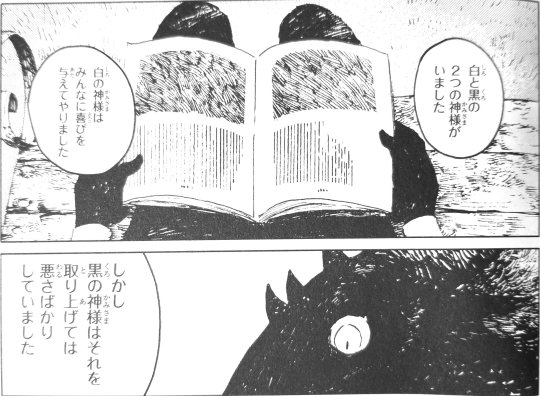
白と黒の2つの神様がいました
白の神様はみんなに喜びを与えてやりました
しかし黒の神様はそれを取り上げては悪さばかりしていました
There were two gods, one white, one black.
The white god bestowed joy upon everyone.
However, the black god constantly took that joy away, and wrought only evil.
[Language purposely elevated to keep the fairy tale/mythic feel.]
(『とつくにの少女』 The Girl from the Other Side: Siúil, a Rún, vol. 1 by Nagabe)
On top of the 3 usages above, Maggie-sensei lists a few more. Be sure to check out her page for more examples from a native speaker!
Advice & Suggestions
This one is another usage that is similar to ~たら, this time giving the advice a more elevated feel than the casual たら, or softens the impact of a straightforward ていただけませんか.
Aてはいかがでしょう。
Aてはいただけませんか。
Aては… [unfinished to allow listener to fill in the blanks]
Attempt with expected failure
ては is used to modify てみる when you're not optimistic about the outcome of an attempt.
Aてはみます。
I will at least give A a try...
J-Rock Examples:
山際も星も/ぼくらに気付いては/お話もした
Both the mountain ridge and the stars / Whenever they noticed us / Told us stories as well
[赤い光線 - 交信]
東京にすがりついては/泣きじゃくって 言えやしなくて
I’m always clinging to Tokyo / and crying and I just can’t say it
[関取花 - 東京]
革靴は知らぬうちに/あのリズムを奏でては列車中に空しく響く
Whenever my leather shoes unconsciously / tap out that rhythm, it echoes through the train in vain
[関取花 - 石段のワルツ]
124 notes
·
View notes
Text
096 JLPT N4 Grammar 文法・例文:~たばかり
096 JLPT N4 Grammar 文法・例文:~たばかり
096 JLPT N4 Grammar 文法・例文:~たばかり
接続:動詞のタ形+ばかり
意味:Just, have just
来(き)たばかりです Just came
買(か)ったばかりです Just Bought
出(だ)したばかりです Just served
食(た)べたばかりです I just ate
例文
先月日本(せんげつにほん)へ来(き)たばかりです。I just came to Japan last month.
買(か)ったばかりの傘(かさ)をなくしてしまった。I lost my umbrella that I just bought.
さっきメールを出(だ)したばかりなのに、もう返事(へんじ)が返(かえ)ってきた。I just sent an e-mail but already got a…
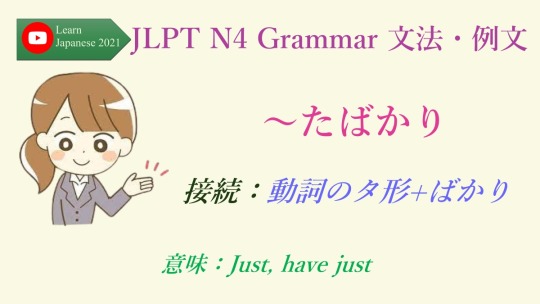
View On WordPress
18 notes
·
View notes
Text



Parte 2:Razones por las que a los japoneses jamás se le va a dar bien el inglés: Sean bienvenidos, japonistasarqueológicos, a una nueva entrega, en esta ocasión hablamos del inglés en Japón, una vez dicho esto pónganse cómodos qué empezamos.
-
Por la que a los japoneses les cuesta el inglés más de una te sorprenderá, los japoneses para poder aprender inglés desde cero les lleva alrededor de 500 horas alcanzar el nivel principiante; sin embargo, se necesitan unas 250 horas para aprender coreano o indonesio al mismo nivel principiante. Una de las razones por las que los japoneses no son buenos en inglés es debido a la pronunciación, esto es un hecho.
-
La estructura gramatical del inglés es: SVO (sujeto-verbo-objeto) donde el verbo va primero, mientras que en japonés, SOV (Sujeto-Objeto-Verbo) donde el verbo va al final. Además, la estructura de las oraciones difiere entre el inglés y el japonés, el inglés es muy estricto en cuanto al orden de las palabras. En japonés utilizamos unas 120 palabras en un minuto de conversación normal. El inglés emplea aproximadamente 1,5 veces más palabras, razón por la cual los japoneses sienten que hablan inglés más rápido. Por ejemplo, la palabra japonesa “personalidad” tiene tres fonemas. Cuando se trata de inglés, necesitamos cinco fonemas: pa/so/na/li/ti, y para transmitir la misma información, necesitamos hablar más rápido. La razón por la que a los japoneses les resulta difícil escuchar y hablar inglés es probablemente porque se les exige que usen habilidades que normalmente no emplean.
パート2:日本人が決して英語が得意にならない理由:日本の考古学者たちよ、新しい回へようこそ!今回は日本の英語について話す。
-
なぜ日本人は英語が苦手なのか?日本人がゼロから英語を学んで初級レベルに達するには約500時間かかるが、韓国語やインドネシア語を学んで同じ初級レベルに達するには約250時間かかる。日本人が英語を苦手とする理由のひとつに発音があるが、これは事実である。
-
英語の文法構造はSVO(Subject-Verb-Object)で動詞が先に来るのに対し、日本語はSOV(Subject-Object-Verb)で動詞が最後に来る。また、文の構造も英語と日本語では異なり、英語は語順に非常に厳しい。日本語の場合、通常の会話で1分間に使う単語は約120語。英語はその約1.5倍の単語を使うので、日本人は英語を話すのが早いと感じるのです。例えば、日本語の「パーソナリティ」という単語には3つの音素がある。それが英語になると、パ/ソ/ナ/リ/ティの5つの音素が必要になり、同じ情報を伝えるためには、より速く話す必要がある。日本人が英語を聞くのも話すのも難しいと感じるのは、普段使わない能力を要求されるからだろう。
-
今後の記事でお会いできることを楽しみにしています。
Part 2: Reasons why the Japanese will never be good at English: Welcome, Japanese archaeologists, to a new instalment, this time we are talking about English in Japan, so make yourselves comfortable and let's get started.
-
Why the Japanese have a hard time with English more than one will surprise you, it takes the Japanese around 500 hours to learn English from scratch to reach beginner level; however, it takes around 250 hours to learn Korean or Indonesian to the same beginner level. One of the reasons why Japanese people are not good at English is because of pronunciation, this is a fact.
-
The grammatical structure of English is: SVO (Subject-Verb-Object) where the verb comes first, while in Japanese, SOV (Subject-Object-Verb) where the verb comes last. Also, sentence structure differs between English and Japanese, English is very strict about word order. In Japanese we use about 120 words in one minute of normal conversation. English uses about 1.5 times as many words, which is why Japanese people feel they speak English faster. For example, the Japanese word "personality" has three phonemes. When it comes to English, we need five phonemes: pa/so/na/li/ti, and to convey the same information, we need to speak faster. The reason why Japanese people find it difficult to listen to and speak English is probably because they are required to use skills they do not normally use.
-
I hope you like it and see you in future posts, have a good week.
14 notes
·
View notes
Text
05.01.24 Basic verb conjugation
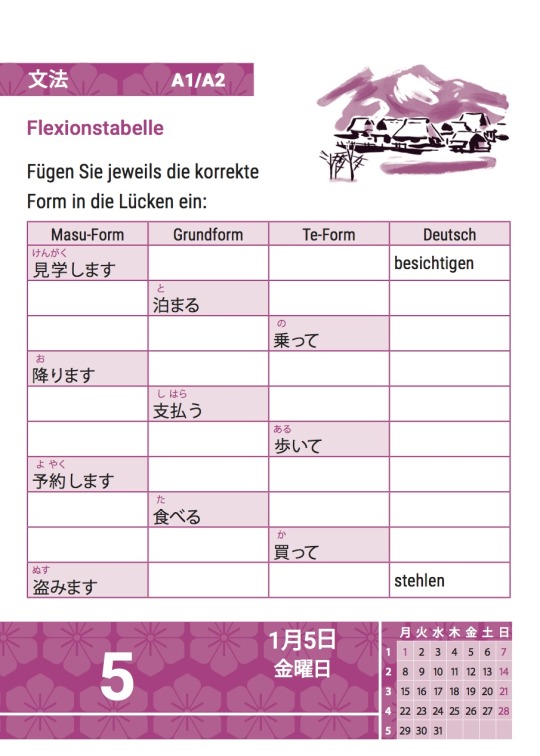
Vocab
見学する(けんがくする)to view; to tour
泊まる(とまる)to stay overnight
乗る(のる)to ride; to board
降りる(おりる)to get off (a bus); to get out of (a car); to disembark
支払う(しはらう)to pay
歩く(あるく)to walk
予約する(よやくする)to reserve; to promise
食べる(たべる)to eat
買う(かう)to buy
盗む(ぬすむ)to steal
Answer

10 notes
·
View notes
Text
改まった形|Polite Forms
In formal settings like in a business meeting or at a public gathering some words are switched with politer forms. You often hear them when somebody is giving a speech, holding a presentation or on TV. But they appear in written form as well, especially in business context. Basically, everywhere where keigo is used, it is also expected to apply politer forms.
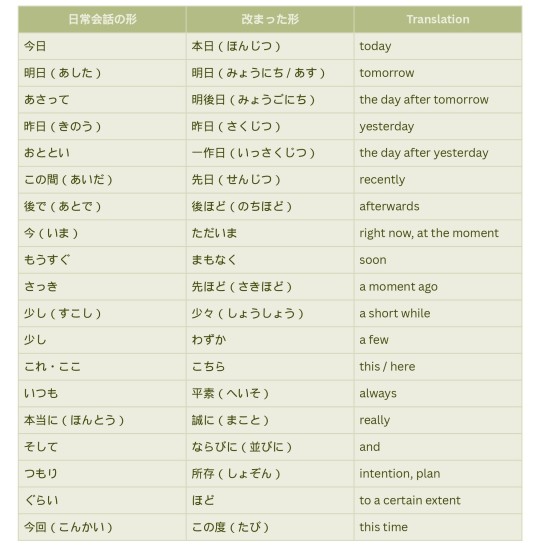
#文法#敬語#japanese langblr#langblr#studyblr#study movitation#learning japanese#japanese vocabulary#japan#japanese#study blog#study notes#language blog#keigo#japanese studyblr#japanese grammar#japanese language#日本語#日本語の勉強#nihongo
154 notes
·
View notes
Text
JLPT Grammar げ・がち・っぽい・気味
What is the difference in usage among げ、がち、っぽい、and 気味? These grammar points can be difficult to differentiate, so I have gathered some notes and examples here. These grammar points are JLPT N3/N2 grammar points.
★~げ★
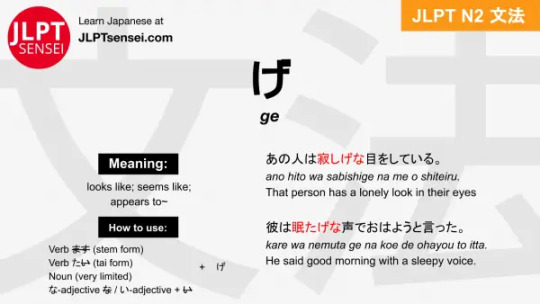
This is used it to describe something or someone (not yourself) who looks~ / seems~ / appears to~.
It is similar to そうに・そうな (sou ni / sou na), but げ (ge) is much more restricted with what words it can be paired with.
It is usually used to describe things like one’s emotions or state of being, whereas そう (sou) can be used with more general things like weather, etc.
Although this grammar is mostly used with adjectives, it can also be used with some verbs and nouns.
何か、言いたげだね。
They look like they want to say something.
ずいぶん、自信ありげだね。
You seem very confident.
そりゃあちょっとあやしげに見えますからね、そう思いませんか?
Well, that looks a little suspicious, don't you think?
同級生にテストの結果を聞くと、嬉しげな顔で100点だったと答えてくれた。
When I asked my classmate how they did on the test, they answered with a happy face that they got a perfect score.
★~がち★
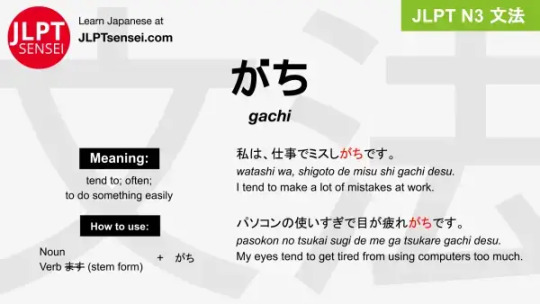
This is usually used for something negative.
ありがち = tend to have
になりがち = tend to become ~
遅れがち = tend to be late
留守がち = tend to be absent
彼は、学校をサボりがちです。
He is always skipping school.
ずっと曇りがちの天気が続いている。
The constant cloudy weather keeps continuing.
一人暮らしなので、コンビニ弁当ばかり食べがちだ。
I live alone, so I tend to only eat convenience store meals.
私は空腹の時は機嫌が悪くなりがちだ。
When I am hungry I easily get into a bad mood.
★~っぽい★
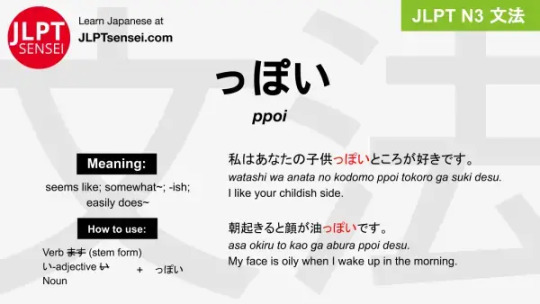
① When following a noun or い-adjective, this means -ish, -like, -ly. Note: The number of adjectives that can be used with this are limited.
子供っぽい = childish, childlike
男っぽい = manly, like a man
女っぽい = womanly, like a woman
油っぽい = oily, lots of oil
② When following a verb, this means easy to do, or often do~. Note: This cannot be used with all verbs.
忘れっぽい = easy to forget, often forget
怒りっぽい = easy to anger, often angry
このコート、デザインはいいけれど、生地が安っぽいね。
This coat has a nice design, but the material looks cheap.
油っぽい食事は好きじゃない。
I don't like oily foods.
年を取ると、忘れっぽくなる。
As you get older, you become more forgetful.
君は飽きっぽいから何事も成功しないのだ。
You do not succeed in anything because you are quick to lose interest.
★~気味 (ぎみ)★
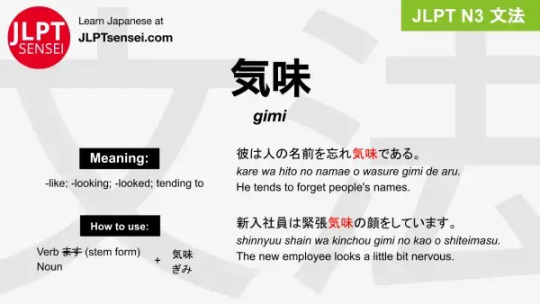
This is used to express that something looks or seems to be a certain way.
疲れ気味 【つかれぎみ】= looks / seems tired.
太り気味 【ふとりぎみ】 = looks / seems large
遅れ気味 【おくれぎみ】= tends to be late
寝不足気味 【ねぶそくぎみ】= looks / seems to be sleep deprived
残業続きで疲れ気味だ。
I've been feeling rather tired because of continuous overtime work.
新入社員は緊張気味の顔をしていた。
The new employee looked nervous.
彼は人の名前を忘れ気味である。
He tends to forget people's names.
彼女は遠慮気味にそう言った。
She said that hesitantly.
#日本語#japanese#japanese language#japanese langblr#japanese studyblr#langblr#studyblr#文法#japanese grammar#jlpt n2#jlpt n3#tokidokitokyo#tdtstudy
107 notes
·
View notes
Text
🥁🌲(๑˘▿˘)🎸💬(ര‿ര๑ ) 🌲🎶
🎶𝕊𝕠𝕞𝕖𝕥𝕚𝕞𝕖𝕤 𝕀 𝕨𝕚𝕤𝕙 𝕀 𝕜𝕟𝕖𝕨 𝕪𝕠𝕦 𝕨𝕖𝕝𝕝🎶
Get to know someone with these 𝟭𝟭 Japanese Questions!
👩🏫We’ll help you with the answers
-📚ー
🔊𝐈 𝐖𝐚𝐧𝐭 𝐭𝐨 𝐓𝐞𝐥𝐥 𝐘𝐨𝐮 | ⑪ 𝘽𝙖𝙨𝙞𝙘 𝙅𝙖𝙥𝙖𝙣𝙚𝙨𝙚 𝙌𝙪𝙚𝙨𝙩𝙞𝙤𝙣𝙨 (𝙵𝚒𝚛𝚜𝚝 𝙼𝚎𝚎𝚝𝚒𝚗𝚐)
-💬ー
👋(๑・ω・๑)[◜▿◝]🗯️👋(๑・ω・๑)
QUIZBO™ joins to pronounce useful questions for a first meetingー
We even have some example answers to help you form your own sentences!
#japanese#japanese language#langblr#language#learn japanese#learnjapanese#kiki#koko#language learning#languages#japan#日本語#日本語の勉強#日本語勉強#単語#文法#語彙
3 notes
·
View notes
Text
The Complete Japanese Verb Conjugation Video
youtube
25 notes
·
View notes
Text
「人」と「者」の違いは何ですか?
what’s the difference between 人 and 者?
they both mean ‘person’ or ‘people’, right?
yes. they’re also both suffixes, and are appropriate in formal and casual settings. but there are subtle differences in their usage.
はじめに、その授業の語彙リスト:
first, some vocabulary:
人前 〖 ひとまえ・h'tomàe 〗 in front of people, publicly.
一人の〜 〖 ひとりの〜・h'tori no ~ 〗 one person, as a counter.
(二人、三人、四人、など1 follow an older japanese numbering system and often bear unexpected pronunciations.)
技術 〖 ぎじゅつ・gijúts’ 〗 skill, technique, engineering.
なくなる 〖 無くなる 〗 to go missing, disappear, run out, be used up.
嘘つき 〖 ぎじゅつ・usòts'ki 〗 liar, speaker of untruths.
利用 〖 りよう(する)〗 use, application; to use, profit from, take advantage of.
恨みを買う 〖 うらみをかう 〗 to incur wrath, envy, or resentment. literally means 'to buy a grudge’. i heart this expression so much.
露知らず 〖 つゆしらず 〗 to be utterly ignorant, (blissfully) unaware.
人 can be used just like any other 普通名詞2。
あれから人前で見せる事が少なかったんだ。唯一の技術に自信がなくなって…
since then3, i've rarely shown them4 in public. my confidence in the only skill i’ve got has run dry…
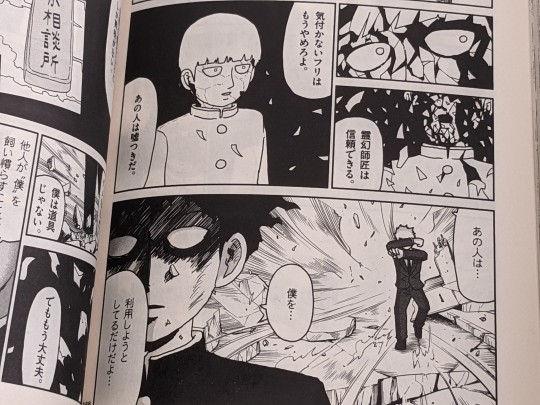
あの人は嘘つきだ。あの人は僕を利用しようとしてるだけだよ…
that person is a liar. that person has only ever tried to use me to his advantage.
ここに1人の超能力者がいる。
there is one person with supernatural abilities here.
者, on the other hand, pretty much always needs a qualifier.
it’s usually a suffix, related to professions or used to describe qualities of people. you won’t find it in an adverbial sense either.
some words with しゃ・もの baked in:
医者 〖 いしゃ 〗 doctor.
偽者 〖 にせもの 〗 imposter, pretender.
信者 〖 しんじゃ 〗 believer(s), faithful.
死者 〖 ししゃ 〗 dead person/people; casualties.
若者 〖 わかもの 〗 young person/people; the youth.
学者 〖 がくしゃ・gak'sha 〗 scholar.
超能力者 〖 ちょうのうりょくしゃ・chounouryok'sha 〗 person with ESP.
here’s an example with a whole sentence modifying it. 者 functions here much like 事 and 物, with the added feature that it lends completion to sentences in formal writing on its own:
これは恨みを買って来たくらいなどを露知らず者。
this is a person who has not the faintest sense of just how much resentment he has managed to bring down upon his head.
usually read ふたり、みたり、よにん… など means et cetera, and so on, and the like... ↩︎
ふつうめいし。the rough equivalent of nouns in japanese. ↩︎
the speaker first noting that his crush seems more interested in athletic boys. he is anything but. ↩︎
his psychic abilities. ↩︎
#langblr#japanese language#japanese langblr#linguistics#japanese#language learning#studyblr#日本語#usage notes#mob psycho 100#mp100#mp100 manga#learning from anime#anime / manga#manga interpretation#manga#manga raw#mp100 spoilers#文法#文法の基本#自分の文書
62 notes
·
View notes
Text
🛒(๑◒ω◒)💦(◒ω◒๑)💦🛒
ᵏᵉᵗᶜʰᵘᵖ🥫・・・🥫 ᶜᵃᵗˢᵘᵖ
In way over your head with Japanese existential verbs?
🌟We’ll guide you!
📖 Choose the best verb for the scenario
& learn appropriate particles!
-🏫ー
𝐏𝐫𝐚𝐜𝐭𝐢𝐬𝐞: 𝐄𝐱𝐢𝐬𝐭𝐞𝐧𝐭𝐢𝐚𝐥 𝐕𝐞𝐫𝐛𝐬 「いる」/「ある」
[𝚀𝚄𝙸𝚉]
#kiki#koko#japanese#learnjapanese#langblr#langblog#japanese langblr#日本語#study#quizbo#learn japanese#japanese grammar#japanese language#language learning#languages#learn language#language#日本語勉強#日本語の勉強#文法#nihongo
2 notes
·
View notes